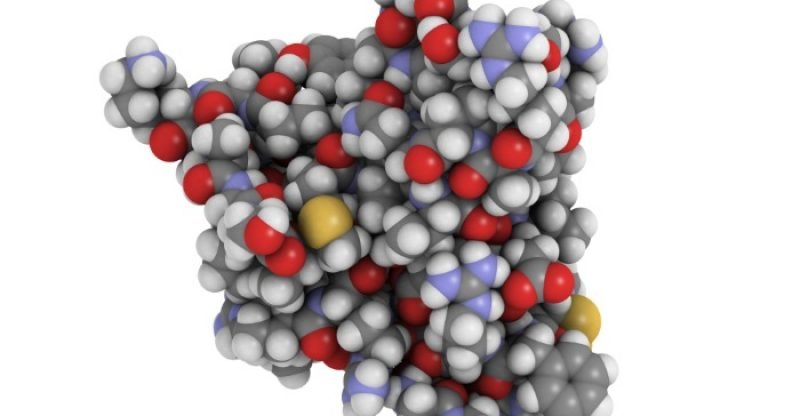16 Science-Backed Benefits of IGF-1 (Insulin-Like Growth Factor 1)
If someone mentions IGF-1, and your first thought is that insulin-like growth factor should be avoided at all costs, then you may want to find out the whole story regarding what is IGF 1.
What is IGF-1?
This crucial hormone is also referred to by other names, such as somatomedin C, and is often known as a sulfation factor.
The reason it is termed “insulin-like” is that its molecular structure is similar to that of insulin.
Some of its effects are said to be nonsuppressible insulin-like activity.
It’s said to be a growth factor for a couple of reasons. It is activated and works with the human growth hormone, somatotropin.
Growth hormone is produced in the anterior pituitary gland.
As GH moves through the blood, it triggers a response from your liver to produce the growth factor somatomedin C.
This growth factor then stimulates cell growth throughout your entire body, resulting in the reproduction and regeneration of cells.
This is necessary for healing, for the strengthening of tissues, and for proper growth and development.
It is especially beneficial for cells in the bones, cartilage, skeletal muscles, skin, nerves, lungs, liver, and kidneys.
Although this growth factor may play a role in regulating the lifespan of other organisms, such as rats, worms, and fruit flies, researchers can’t find an association how somatomedin C may affect human longevity or mortality.
A few studies show that high levels of this growth factor increasing the risk of dying for any reason, while a few show that it’s an IGF-1 deficiency that increases mortality.
Overall, the majority of studies finds no connection at all (1).
For most individuals, it’s generally best to try to remain within the IGF-1 normal range, as studies show that both high and low levels can be detrimental to certain populations (2).
However, if you have certain health concerns, you may want to regulate the amount of this growth factor you have.
For example, those with cancer may want to keep their levels a little lower than average, while those with chronic inflammation or autoimmune disorders may want to increase them just a bit.
Health Benefits of IGF-1
When it comes to the effects of the growth factor on human health, there are both good and bad.
However, the number of positive effects far outnumber the negative ones.
Necessary for Growth
As a growth factor, this hormone is necessary for the proper functioning of GH throughout the body.
Without enough somatomedin C, your body will lose its sensitivity to GH, and its purpose to promote growth and repair of cells.
Deficiency of IGF-1 has been associated with many conditions regarding lack of growth, including the poor growth of the fetus inside of the womb during pregnancy, and the incidence of Laron Syndrome in children, which is a type of dwarfism (3).
Proper levels of this growth hormone during development are so vital that a deficiency can result in shorter height in children.
When provided with long-term treatment with recombinant human growth factor, many children can enjoy the benefit of restored height (4).
Builds Muscles
I’m sure you already know that rat studies are used to simulate what may occur in humans.
Studies in rats have shown that this hormone plays a significant role in triggering an increase in muscle protein and muscle DNA (5).
In these studies, a growth factor solution was infused directly into a non-weight bearing skeletal muscle.
Researchers found that the growth factor-infused muscle tissue weighed about 9 percent more than controlled saline-infused muscles.
While direct growth factor injections may not be plausible in humans, this study shows how important growth factor is to the growth and proliferation of muscle cells.
In humans, somatomedin C has been shown to slow down the muscle loss that is commonly associated with certain wasting diseases and with the aging process (6).
This shows that the studies done in rats may be useful in learning more about how IGFs can be beneficial to humans.
Increases Bone Density
IGFs have a strong role in the formation and maintenance of bone cells because they work so closely with growth hormones (7).
Cells that form the bones are regularly created, destroyed, then reabsorbed by our bodies.
In order to keep this process going at a healthy rate, proper levels of growth factor are imperative.
Many people experience a loss of bone mass as a result of growing older.
Reduced production of the growth factor as we age may play a role.
Studies have shown that older women who have an increased amount of somatomedin C also showed greater bone mineral density than their counterparts with lower levels of this growth factor (8).
It’s important to note that while IGFs are important for bone cell formation and the retention of bone mass during aging, the exact way that this works in our bodies is unknown.
It may be that the bone-increasing effects are due, at least in part, to the muscle-building effects of growth factor, since bone growth is often stimulated by muscle growth (9).
Boosts Brain Power and Mental Processes
You need growth factor for the proper functioning of your brain.
In rats, somatomedin C was shown to reduce cognitive impairment in rats with metabolic conditions, such as diabetes, while ensuring the proper regulation of memory and learning functions in healthy rats (10).
When it comes to cognitive functioning in humans, circulating levels of IGFs in the blood can actually determine overall brain health (11).
Studies on older men show that those with higher levels of this growth factor maintained increased cognitive functioning, especially when it comes to the speed at which the brain processes information (12).
Deficiencies may also lead to depression or anxiety, especially in older adults.
This information can be very important when it comes to finding ways to delay or even to suppress the onset of Alzheimer’s disease and other types of dementia.
Because this is a neuroprotective hormone, it might be especially vital to keep an IGF-1 normal range as we grow older.
As growth factors decline during aging, amyloid-beta levels increase.
Amyloid-beta accumulation in the brain has been shown to be an important factor in the development of dementia and Alzheimer’s disease.
Rat studies have shown that increasing the serum IGF levels decreased levels of amyloid-beta in the brain, proving the importance of maintaining growth factor as we grow older (13).
I’m sure you already know that exercise helps your brain to function normally.
It appears that IGF might have a similar effect on the brain.
Let’s get back to some rat studies.
Rats that were running showed an increase in the reuptake of this growth factor in certain receptors in the brain.
This increased the functioning of these neurons.
The same response was found in rats that were injected with IGF (14).
Regulates Immune Response
This growth factor is very important to our immune systems.
By triggering the production of T-cells in the thymus gland and B-cells in bone marrow, IGFs may help to boost immune function (15).
Natural killer cells are manufactured in the bone marrow, then migrate to the secondary lymphatic system, such as in the spleen, tonsils, and lymph nodes, where they await activation.
This hormone may play a role in the activation of these natural killer cells, which play a role in the destruction of tumors and other infectious agents.
While increasing immune function is generally a good thing, for some individuals it could be bad.
Individuals with autoimmune disease are believed already to have an overactive immune system.
If something increases that functioning, it could lead to an increase in symptoms (16).
May Decrease Inflammation and Autoimmunity
This leads right to the next benefit of having proper levels of somatomedin C growth factor.
While triggering an immune function might seem like it could be bad for those with autoimmune disorders, IGFs may play a beneficial role here, as well, because this growth factor stimulates the growth of regulatory T cells (17).
These cells are also referred to as T-reg cells and suppressor T cells because they modulate the immune system by reducing overactivity and inflammation in certain areas (18).
This can help with the prevention of some autoimmune diseases, such as Type 1 diabetes, multiple sclerosis, and allergic contact dermatitis.
Low growth factor levels have been found in individuals with certain conditions.
These include:
- Inflammatory bowel disease
- Lupus
- Rheumatoid arthritis
- HIV
While this information is curious, there have been no studies to determine if a boost in IGF levels can help with any of these diseases.
Anti-Aging
Your DNA may provide a clue as to how long you will live, because longer telomeres, the cap ends on DNA, seem to predict a longer life.
Higher levels of circulating growth factor throughout the body have been seen in those with longer telomeres (19).
In fact, older men and women with higher levels of IGF were observed to have a decreased risk of mortality from any cause in the following two years in the now-famous Framingham Heart Study (20).
As a part of the natural aging process, many individuals notice a decline in cognitive functioning, decreased mobility, reduced muscle strength, and an overall frailty (21).
These negative effects that are associated with aging are seen more in individuals with a lower growth factor level.
Additionally, it seems that low IGF levels are also seen in patients who are suffering from critical illness.
Can Reduce Oxidative Stress
The insulin-like growth factor can increase your body’s production of certain enzymes that have antioxidant capabilities.
This has been shown to have a protective effect on the inner lining of blood vessels, frequently referred to as vascular endothelial cells (22).
Somatomedin C also increases antioxidant activity in other cells, helping to prevent death in cells exposed to radiation.
If you think about it, this can be both good and bad.
While it’s good that healthy cells can be protected from radiation, this benefit may also be passed on to cancer cells, potentially helping to strengthen these damaged cells and helping them to survive treatment with radiation or chemotherapy.
Good for the Heart
It seems that good levels of growth factor help maintain a stronger heart, as well.
Low levels of IGF in the body have also been associated with conditions that impact cardiovascular health.
These include:
- Coronary artery disease
- Congestive heart failure
- Heart disease
- Stroke
Because of the protective benefits that growth factor has on the inner lining of blood vessels, this can also be good for the prevention of heart disease.
Because of IGF’s anti-inflammatory and antioxidant effects on blood vessels, reduction in plaque accumulation within the blood vessels is associated with normal levels of this hormone.
Additionally, existing plaques can be stabilized, potentially decreasing further health problems (23).
Keeping Skin Vibrant and Looking Younger
If you’re like me, you may have noticed that your skin isn’t as firm and smooth as it was when you were younger.
This is because collagen production typically diminishes as we get older.
Collagen is what helps to regenerate skin and the underlying tissue for a fuller appearance.
When collagen is reduced, this can lead to wrinkles and sagging skin, over a period of time.
The good news is that your dermal layers can remain denser, with the appropriate levels of IGF.
In fact, this hormone can revive stagnant synthesis of collagen, preventing the effects of aging on your appearance.
Maintaining a Healthy Glucose Balance
You probably already know that being overweight has been shown to increase the chances that you will develop Type 2 diabetes or another metabolic disorder.
What you may not know is that individuals with obesity, metabolic syndrome, and insulin resistance have been found to have lower circulating levels of somatomedin C growth factor.
In fact, affected individuals that received IGFs in infusions were able to lower blood sugar, reduce triglycerides, and increase their insulin sensitivity (24).
There may also be a link between Hepatitis C and insulin resistance, as patients with either one of these conditions have been found to have lower levels of growth factor.
Good News for the GI
When there are problems in the gastrointestinal tract, this can often lead to issues that affect other areas of the body through the translocation of bacteria.
Growth factor and growth hormone may play a vital role in keeping the issue contained within the gut, and even with reducing other symptoms.
Animal studies have shown that an IGF/GH combination was beneficial in rats with experimental obstructive jaundice (25).
Bacterial translocation was halted, and liver function also improved.
If you suffer from colitis, it might interest you to know that growth factor may be able to reduce damage in the intestines by promoting mucosal repair through an increase of specific proteins and a stimulation of mucosal DNA (26).
There was also a study that showed there may be some benefit of somatomedin C on gut permeability in premature infants (27).
While no positive association was found between growth factor with regard to feeding tolerance and growth, gut permeability was improved in these preemies by the second week of the study.
However, any benefits were no longer noted by the third week, so more research would be necessary to see if there is really a correlation at all.
May Help to Clear Out Bacteria
Although IGF seemed to keep bacteria from moving from the intestinal tract to other areas of the body, it might help clear bacteria out of other infected areas.
Sepsis is a life-threatening infection of the blood.
It can occur when an infection reaches the bloodstream or as a negative effect of your body’s chemical response to an infection.
Widespread inflammation can occur, potentially creating a cascade of mayhem throughout the body’s systems.
This can result in organ failure and even death.
It seems that growth factor might literally be a life-saver when it comes to sepsis.
Rats with sepsis were given IGF either before or after becoming septic.
All treated rats had an increased chance of survival, whether the treatment was given before or after they developed sepsis (28).
This effect may occur because of increased liver functioning that helped to filter out the harmful bacteria from the bloodstream.
For those who suffer from Cystic Fibrosis, the growth factor may help to reduce the risk of infection in the lungs (29).
Particles that can lead to toxicity, allergy, or infection might make it past the first level of protection in the respiratory system, beginning with the nasal passages.
Alveolar macrophages in the lungs are the next defense, the first in the lower airways.
These macrophages work to clear out particles before they can invade the lung tissue.
IGFs are lower in those with CF, and growth factors are necessary for the proper functioning of alveolar macrophages.
Increasing IGFs can increase clearance of bacteria and other harmful matter from the lungs, which is especially important for those with CF.
Body Composition and Electrolyte Balance
Children and adults who are deficient in growth hormone may suffer from detrimental changes in body composition (30).
Low GH has been associated with an increase in both subcutaneous and visceral fat distribution, and with lowered levels of sodium and overall hydration within the body.
Those treated with a combination GH/IGF showed an increase in body volume due to increased water in cells and a more stable electrolyte balance.
Additionally, lean mass was increased, while fat decreased.
May Improve Liver Health
As the liver is the main organ for circulating growth factor, it stands to reason that those with liver damage, or cirrhosis, have been found to have lower levels of this hormone.
Growth factor combined with growth hormone is responsible for the regeneration of liver cells.
An increase in production of IGF-1 has a positive impact on liver regeneration by supporting DNA synthesis and hepatocyte proliferation (3).
Because the regeneration effects appear to be greater than the growth seen with healthy and intact liver, this could help in the prevention of cirrhosis and other types of liver degeneration.
Side Effects
Although there might be fewer side effects than benefits associated with IGFs, these can greatly affect your health and longevity.
Cancer
High levels of IGFs in the body have been associated with the development, progression, and spreading of certain types of cancer, such as:
Because of the protective effects that growth factor has on cells, it can also strengthen cancer cells, leaving them resistant to the most common treatment methods.
Many research studies focus on growth factor levels alone and don’t take into account the receptors and binding proteins that all work together in this system.
Lowering your IGF levels too much may not be a good thing, as older men with cancer had an increased risk of dying from levels that were too low or too high (35).
Acne and Growth Factor
It’s true that hormones play a role in the development of acne, as you may remember from your teenage years when hormone levels are at an all-time high.
However, the reasons for acne that persists into adulthood aren’t always so clear-cut, especially for women.
Higher levels of IGF are associated with an increased acne lesions in adult women (36).
How to Raise IGF Levels
If you have an IGF-1 deficiency, you may be able to increase levels on your own if the condition isn’t too severe.
Otherwise, you will want to discuss your options for supplementation with your healthcare provider.
If you have a genetic predisposition to autoimmune issues, increasing growth factor may help.
Because protein and fat intake can increase somatomedin C, eating foods rich in these macronutrients may help.
Make sure you get enough dairy in your diet, as well as foods that are rich in Vitamin C.
It’s also important to get enough of the minerals zinc, magnesium, and selenium.
Keeping certain hormones at the appropriate levels can also keep growth factor in a good range.
These include estradiol, prolactin, DHEA, growth hormone, parathyroid hormone, and cortisol.
How to Lower IGF Levels
If your growth factor levels are too high, you might want to take some action to bring them down a bit.
This is especially true if you have a genetic predisposition to cancer.
A reduction of dietary protein and calories has been shown to lower IGFs.
Intermittent fasting might be a good choice to do both of these at the same time.
As protein and fat can increase this hormone, foods that are rich in carbohydrates can lower it.
But remember, fat-rich foods can increase IGF, potentially negating any effects that carbs might have.
Vigorous, long-distance walking can lower your growth factor levels, at least following the activity. Other forms of intense exercise might play a role as well.
Certain compounds and phytonutrients that can be found in the foods we eat can also help lower this potentially damaging hormone.
These include luteolin, curcumin, apigenin, lycopene, and epigallocatechin gallate (EGCG).
The Link between IGF Range and Certain Diseases
When it comes to breast cancer, premenopausal women who have growth factor levels over 207 are at an increased risk for developing this disease.
Women who were between the ages of 45 and 60 who were diagnosed with breast cancer showed levels between 170 and 190 (37).
Men with levels of IGF that are over 185 are at increased risk of developing prostate cancer.
Men with ages between 60 and 65 who had been diagnosed with prostate cancer were found to have levels of growth factor between 150 and 170 (38).
Men also have an increased risk of dying from cancer when their level is above 190.
This same level is shown to produce an increased risk for men of developing certain types of cardiovascular disease (39).
Extremely low levels of growth factor of around 70 to 80 have been associated with an increased risk of disease development and mortality from any source (40).
Conclusion
Because there can be potential issues from too much or too little IGF in the body, it can be good to make sure that you stay within appropriate levels.
While higher levels of growth factor have been shown to have a positive effect on many health issues, they can also be detrimental in other ways.
The same can be said of lower levels. So it can be beneficial to moderate.
Because we are all unique, you have to choose what’s best for you and your health.
You may want to talk to your healthcare provider to see where you are when it comes to the way growth factor is working in your body.
FDA Compliance
The information on this website has not been evaluated by the Food & Drug Administration or any other medical body. We do not aim to diagnose, treat, cure or prevent any illness or disease. Information is shared for educational purposes only. You must consult your doctor before acting on any content on this website, especially if you are pregnant, nursing, taking medication, or have a medical condition.
HOW WOULD YOU RATE THIS ARTICLE?





